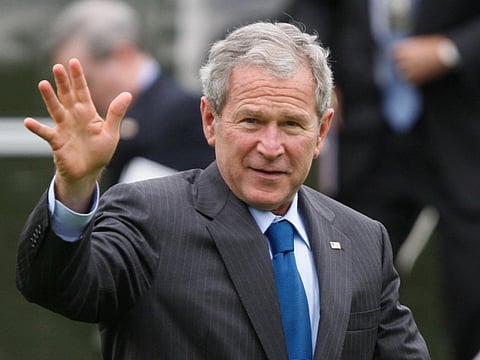Why I miss George W. Bush
His foreign policy may have harmed Muslims abroad, but at home, he refused to conflate Islam with terrorism

As a Briton who, like millions of my compatriots, opposed the United States-led invasion of Iraq in 2003, I did not expect to ever find much to admire about US president George W. Bush. But as a Muslim who has come to work in America, I have recently had to revise my opinion.
Less than a week after the September 11, 2001, attacks that killed 2,996 people, Bush held a news conference at the Islamic Centre of Washington. “The face of terror is not the true faith of Islam,” he said, flanked by imams and community leaders. “Islam is peace”. It was a message repeated often in the months and years afterward. “Our war is against evil,” the president said, “not against Islam.”
Fourteen years later, such remarks seem distant, if not improbable, amid the miasma of anti-Muslim hate and fearmongering fostered by the Republican candidates for president.
In recent days, Donald J. Trump has claimed that “thousands and thousands” of Muslims in Jersey City celebrated the fall of the World Trade Center twin towers — a statement refuted by the city’s mayor and rated by the fact-checking watchdog PolitiFact as “Pants on Fire”. Trump has also said he “would certainly implement” a federal database to register America’s estimated three million-plus Muslims and would not rule out asking Muslim-Americans to carry a special form of ID noting their faith.
Another contender, the former neurosurgeon Ben Carson, says he is opposed to a Muslim being allowed to run for president because Islam is “inconsistent” with the US Constitution. He also compared some Syrian refugees to “rabid dogs”.
The anti-Muslim animus extends even to establishment Republican candidates. Jeb Bush, the former Florida governor, said he would prefer to give asylum to Christian, rather than Muslim, refugees. Senator Marco Rubio of Florida, meanwhile, tried to outdo Trump by saying he’d close not only mosques, but Muslim cafes and diners, too.
Senator Rand Paul, the libertarian who earlier this year held up the renewal of the Patriot Act with a filibusterlike 11-hour speech in the Senate, now demands “heightened scrutiny” of Muslim immigrants. His Senate colleague Ted Cruz claims that Sharia “is an enormous problem” in the US.
Working our way down the roster, what of the former governor of Arkansas Mike Huckabee or Governor John Kasich of Ohio? Huckabee has called Islam “a religion that promotes the most murderous mayhem on the planet” and Kasich has proposed a federal agency to spread “Judeo-Christian western values”.
Governor Chris Christie of New Jersey is an exception among Republican presidential candidates for pushing back against the anti-Muslim “crazies” and their talk about Sharia. That was in 2011, but now even Christie has taken a hard-line stance against Syrian refugees. That Christie is polling at about 3 per cent, while Trump leads the field, suggests that Islamophobia is a vote winner with the modern GOP.
Out of sync
The election of a non-white president with Hussain as a middle name, not to mention the rise of Daesh (the self-proclaimed Islamic State of Iraq and the Levant), only served to harden the prejudices of some core GOP voters. Today, fully 83 per cent of Republicans agree with Carson that a Muslim shouldn’t be president. Only half (49 per cent) of GOP voters in Iowa think Islam should be legal in the US.
It is important to recognise how out of sync such views are with the Republican Party’s historical record. In 1957, Dwight D. Eisenhower became the first sitting president to speak at an American mosque. At the inauguration ceremony of the same Islamic centre that Bush visited in 2001, Ike assured his audience that America “would fight with her whole strength” for Muslims’ right to worship according to their conscience.
In 1974, Gerald R. Ford became the first president to send an official message to Muslim-Americans for Eid Al Fitr, the festival that marks the end of Ramadan, saying that America’s diversity had been “greatly enhanced” by the “religious heritage” of Muslim-Americans. In 1981, Ronald Reagan nominated America’s first Muslim ambassador, the convert Robert Dickson Crane.
These were the Republican footsteps that Bush was following in 2002 when he became the first president to visit an American mosque on Eid. He had the advantage, of course, of being an incumbent president, rather than a prospective candidate. Yet, he and advisers like Karl Rove and Michael Gerson understood that demonising Muslims and depicting Islam as “the enemy” not only fuelled Al Qaida’s narrative, but also hurt their party’s electoral prospects.
Minorities matter — in general, if not primary, elections. Muslims constitute just 1 to 2 per cent of voters in the US, but in 2000, when the presidential election turned on just 537 votes in Florida, more than 46,000 Muslims in that state voted Republican. In the view of the influential conservative activist Grover Norquist, “George W. Bush was elected president of the United States of America because of the Muslim vote”.
Bush’s foreign policy may have harmed Muslims abroad, but at home, he courted Muslim-American voters and refused to lazily conflate Islam with terrorism.
I listen to the irresponsible Muslim-hating rhetoric of the current crop of candidates. I never thought I’d say it, but now I long for the Republican Party of George W. Bush.
— New York Times News Service
Mehdi Hasan is the host of the Al Jazeera English show UpFront.


